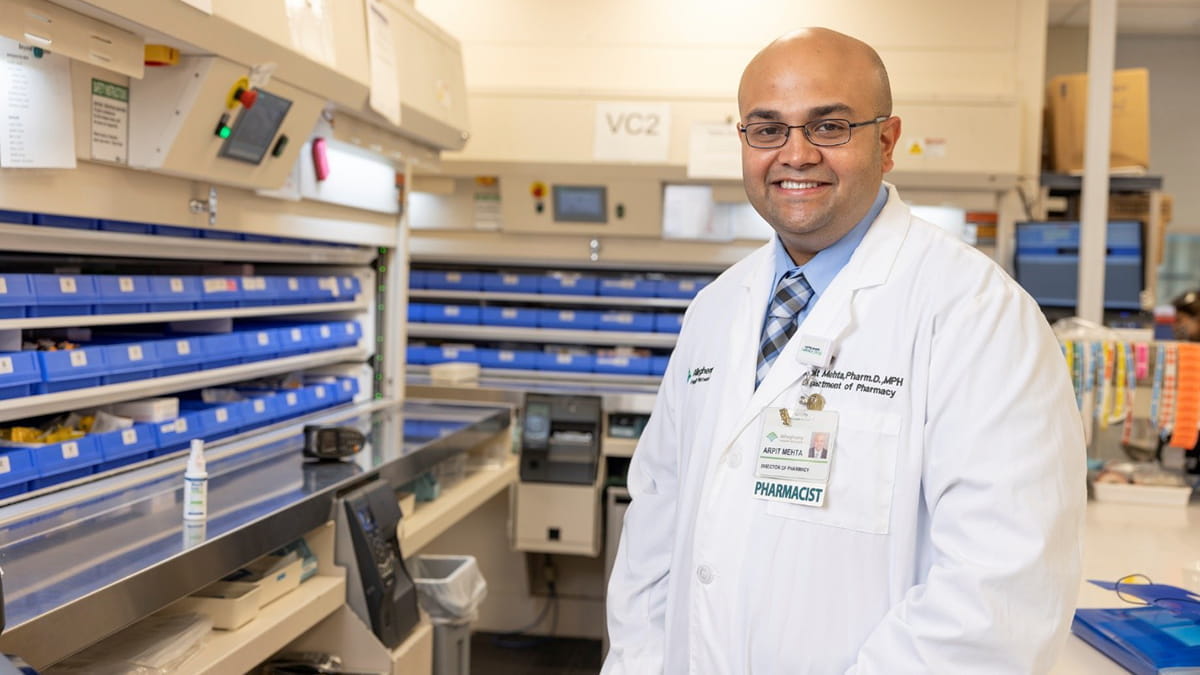The lifesaving medications that hospitals provide to patients don’t come from a pharmacy down the street, but instead from FDA-designated 503B compounding pharmacies. Unfortunately, the supply distribution coming from these facilities isn’t always steady, and it can be a problem for hospitals such as Pittsburgh’s 650-bed Allegheny General Hospital (AGH). Luckily, Arpit Mehta ’20, director of pharmacy for Allegheny Health Network, found a high-tech solution.
Mehta decided to insource rather than outsource. He found that IV-compounding robots could produce high-quality medications safely and effectively. By bringing robotic technology to the hospital, he could control both inventory and quality. Additionally, by compounding in-house, the hospital would realize a significant savings.
Using robots on-site for compounding is a newer concept. “Less than 6% of hospitals in the country have robotics,” Mehta says. He feels that fear of the unknown has caused hesitation in embracing the technology. But for Mehta, an innovative healthcare administrator, it was an easy decision.
In April 2020, the first IV-compounding robot was installed in the AGH pharmacy. Between May 2020 and April 2021, the robot—which is nicknamed Richard Mixon because it mixes medications—produced 46,909 products and generated $1.2 million in savings. The administration was so satisfied with these results that AGH recently installed another IV robot. It too has earned nicknames: Sir Mix-a-Lot and IV Mix-a-Lot. Technology improves quickly, and the second robot operates up to five times faster than the first. With the two robots, the pharmacy anticipates compounding 120,000 doses annually, at a savings of $2.5 million compared to using a traditional 503B compounding facility.
Mehta earned his Master of Healthcare Administration (MHA) degree from Walden University the same year Richard Mixon was installed at AGH, and he’s not the only one in his family with a master’s in healthcare administration. His wife, Kim Mehta ’20, graduated with an MHA degree from Walden the same year. Mehta says that when selecting a university for their online master’s degrees, the couple was looking for an institution that would allow them to complete their education at their own pace while also offering the flexibility they needed with their busy work schedules.
The Walden alumni also appreciate the university’s commitment to social change. “I think there is a lot of value in it in the world we live in today, and especially in healthcare,” says Mehta. By using his education and technology to improve patient care in Pennsylvania, he is putting the concept of social change to work.
Walden University is one of the top granters of healthcare administration master’s degrees in the U.S.1 You can earn your MHA degree while continuing to work full time, because Walden’s online degree program is designed for working professionals.
Walden is an accredited university offering a Master of Healthcare Administration (MHA) degree program online. Expand your career options and earn your degree using a convenient, flexible learning platform that fits your busy life.
1Source: National Center for Education Statistics (NCES) IPEDS database from 2013–2019. Based on the most recent year of completions survey data available, using CIP code 51.0701 “Master’s degree – Health/Health Care Administration/Management” for Master’s degrees (Award level 7). Available at https://nces.ed.gov/ipeds/use-the-data. (Retrieved July 2021; may consist of or include provisional release data.)
Note on Licensure
The Master of Healthcare Administration (MHA) is not a licensure-leading program and does not prepare an individual to become a licensed professional in healthcare administration, healthcare leadership, nursing home administration, or other similar positions.
Walden University is accredited by The Higher Learning Commission, www.hlcommission.org.




